Despite public anger, Lebanon vote set to entrench status quo




Layal Abou Rahal
Tue, May 10, 2022,
Lebanon's elections Sunday won't yield a seismic shift despite widespread discontent with a graft-tainted political class blamed for a painful economic crisis and a deadly disaster, experts say.
Given Lebanon's sectarian-based politics, it will likely "reproduce the political class and give it internal and international legitimacy", said Rima Majed of the American University of Beirut.
"Maybe candidates from the opposition will clinch some seats, but I don't think that there will be a change in the political scene," said Majed, an expert in sectarianism and social movements.
Beirut voter Issam Ayyad, 70, put it more simply: "We will not be able to change."
The small country's political system has long distributed power among its religious communities, entrenching a ruling elite that has treated politics as a family business.
By convention, the Lebanese president is a Maronite Christian, the prime minister a Sunni Muslim, and the speaker of parliament a Shiite.
In the current parliament, the Shiite Hezbollah party and its allies, including the Christian Free Patriotic Movement, command a majority.
The system has held back the emergence of non-sectarian political parties and civil society representatives.
The elections will be the first since a youth-led protest movement broke out in October 2019 against a political class seen as inept, corrupt and responsible for a litany of woes, from power blackouts to piles of uncollected garbage.
The anger exploded into months of street rallies but lost momentum as the Covid-19 pandemic hit, together with a financial crash that the World Bank has labelled one of the world's worst in modern times.
- 'Game of loyalty' -
Popular fury flared again after a huge stockpile of ammonium nitrate that had languished in a Beirut port warehouse for years exploded in August 2020, killing more than 200 people and devastating entire neighbourhoods.
Successive governments have since failed to chart a path out of Lebanon's worst crisis since the 1975-1990 civil war that has sparked runaway inflation, deepened dire poverty and fuelled a mass exodus.
Where the Lebanese state has failed to provide basic services, traditional political leaders have tended to step in with their decades-old patronage networks -- a trend more alive than ever during the current crisis.
"The elections are not meant to assess the performance of politicians," said Majed. "They are more a game of loyalty to whoever provides... the most basic services."
Public sector jobs have long been among the main handouts, but now fuel and cash assistance also feature high on the list, giving an advantage to established parties over new opposition groups that lack funds and foreign support.
While bolstered by the 2019 protest movement, new independent candidates have also failed to build a coherent front that could energise a dispirited electorate, observers say.
Nearly 44 percent of eligible voters plan to abstain, according to a survey last month of more than 4,600 voters by British charity Oxfam.
- Voter intimidation -
Polling expert Kamal Feghali said many voters had hoped the newcomers would run "with a unified list and programme" but said that instead their competing electoral lists "will scatter the vote".
While independents will likely do slightly better than in 2018, when only one of them won a seat, said Feghali, the winner once more is likely to be Hezbollah, Lebanon's biggest political and military force, and its allies.
Iran-backed Hezbollah, first formed as a resistance force against neighbour Israel, is now often described as a state within a state that is all-powerful in regions under its control.
Its pre-election intimidation tactics are "salient", said Oxfam, warning that such behaviour tells voters "that change might be denied, and in turn might lead to either a reduction in turnout or a distortion in voting behaviour".
In east Lebanon's Bekaa Valley, three Shiite candidates were running on an anti-Hezbollah list but withdrew last month, despite the expiry of a legal deadline to do so.
The move stripped the anti-Hezbollah list of essential Shiite representation and was widely seen by local media as a result of pressure by the powerful movement.
lar/ho/dwo/fz/lg




Layal Abou Rahal
Tue, May 10, 2022,
Lebanon's elections Sunday won't yield a seismic shift despite widespread discontent with a graft-tainted political class blamed for a painful economic crisis and a deadly disaster, experts say.
Given Lebanon's sectarian-based politics, it will likely "reproduce the political class and give it internal and international legitimacy", said Rima Majed of the American University of Beirut.
"Maybe candidates from the opposition will clinch some seats, but I don't think that there will be a change in the political scene," said Majed, an expert in sectarianism and social movements.
Beirut voter Issam Ayyad, 70, put it more simply: "We will not be able to change."
The small country's political system has long distributed power among its religious communities, entrenching a ruling elite that has treated politics as a family business.
By convention, the Lebanese president is a Maronite Christian, the prime minister a Sunni Muslim, and the speaker of parliament a Shiite.
In the current parliament, the Shiite Hezbollah party and its allies, including the Christian Free Patriotic Movement, command a majority.
The system has held back the emergence of non-sectarian political parties and civil society representatives.
The elections will be the first since a youth-led protest movement broke out in October 2019 against a political class seen as inept, corrupt and responsible for a litany of woes, from power blackouts to piles of uncollected garbage.
The anger exploded into months of street rallies but lost momentum as the Covid-19 pandemic hit, together with a financial crash that the World Bank has labelled one of the world's worst in modern times.
- 'Game of loyalty' -
Popular fury flared again after a huge stockpile of ammonium nitrate that had languished in a Beirut port warehouse for years exploded in August 2020, killing more than 200 people and devastating entire neighbourhoods.
Successive governments have since failed to chart a path out of Lebanon's worst crisis since the 1975-1990 civil war that has sparked runaway inflation, deepened dire poverty and fuelled a mass exodus.
Where the Lebanese state has failed to provide basic services, traditional political leaders have tended to step in with their decades-old patronage networks -- a trend more alive than ever during the current crisis.
"The elections are not meant to assess the performance of politicians," said Majed. "They are more a game of loyalty to whoever provides... the most basic services."
Public sector jobs have long been among the main handouts, but now fuel and cash assistance also feature high on the list, giving an advantage to established parties over new opposition groups that lack funds and foreign support.
While bolstered by the 2019 protest movement, new independent candidates have also failed to build a coherent front that could energise a dispirited electorate, observers say.
Nearly 44 percent of eligible voters plan to abstain, according to a survey last month of more than 4,600 voters by British charity Oxfam.
- Voter intimidation -
Polling expert Kamal Feghali said many voters had hoped the newcomers would run "with a unified list and programme" but said that instead their competing electoral lists "will scatter the vote".
While independents will likely do slightly better than in 2018, when only one of them won a seat, said Feghali, the winner once more is likely to be Hezbollah, Lebanon's biggest political and military force, and its allies.
Iran-backed Hezbollah, first formed as a resistance force against neighbour Israel, is now often described as a state within a state that is all-powerful in regions under its control.
Its pre-election intimidation tactics are "salient", said Oxfam, warning that such behaviour tells voters "that change might be denied, and in turn might lead to either a reduction in turnout or a distortion in voting behaviour".
In east Lebanon's Bekaa Valley, three Shiite candidates were running on an anti-Hezbollah list but withdrew last month, despite the expiry of a legal deadline to do so.
The move stripped the anti-Hezbollah list of essential Shiite representation and was widely seen by local media as a result of pressure by the powerful movement.
lar/ho/dwo/fz/lg
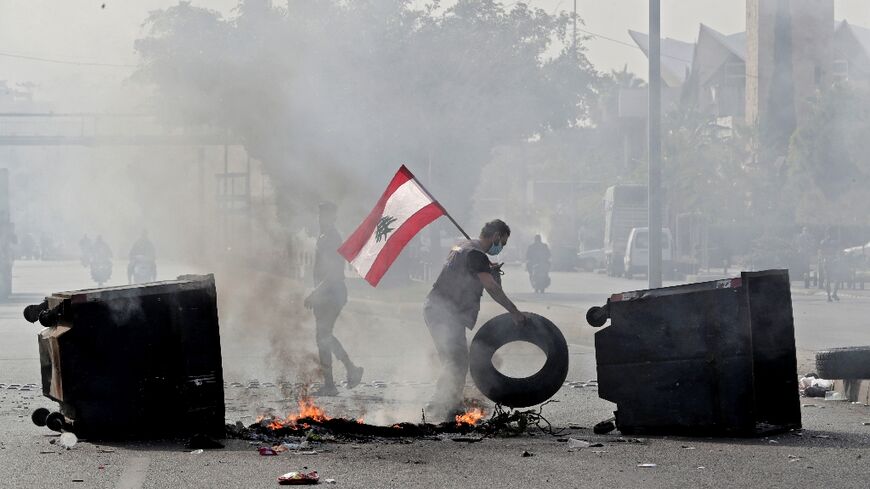
Lebanese protesters block a highway during a protest in the capital Beirut on November 29, 2021, as the country struggles with a deep economic crisis -
Anwar AMRO Agence France-Presse
Beirut (AFP)
Lebanon, a small Mediterranean country wracked by political and economic turmoil and the fallout of the decade-old Syrian conflict next door, holds parliamentary elections on May 15.
Here are some key facts about Lebanon.
- Multi-confessional -
The country with the cedar tree flag is one of the smallest in the Middle East, at about 10,000 square kilometres (3,900 square miles).
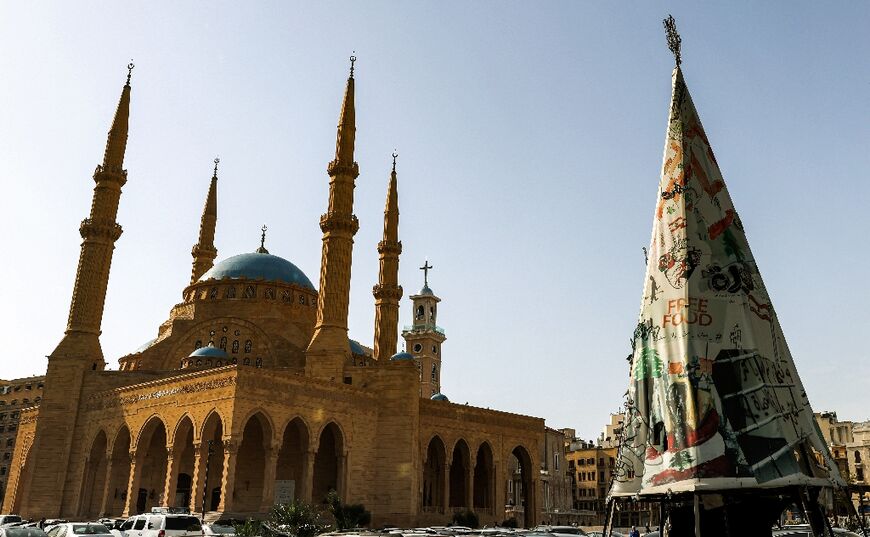
Its population of around 4.5 million Lebanese is dwarfed by its diaspora, spread across the Americas, Europe, Africa and Australia.
Lebanon is considered relatively liberal in a broadly conservative region. Political power is split between 18 recognised religious communities under a confessionalist form of government.
Lebanon is a parliamentary republic, with a 128-member house split between Muslims and Christians.
In line with Lebanon's "national pact" dating back to independence from France in 1943, the president must be a Maronite Christian, the prime minister a Sunni Muslim and the parliament speaker a Shiite.
- Between Israel and Syria -
Lebanon endured a brutal civil war between 1975 and 1990 and was under Syrian domination from the 1990s until troops withdrew in 2005.
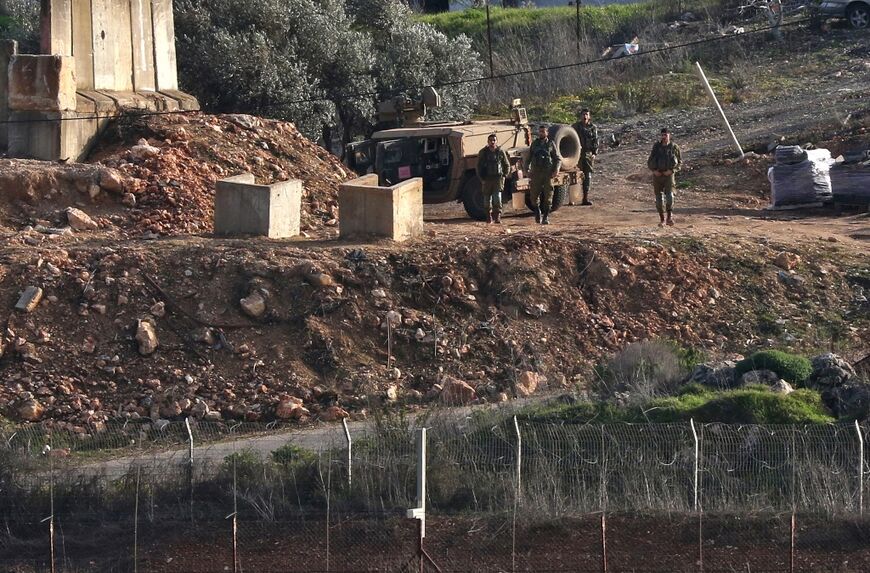
Its political institutions have long been paralysed by disagreement between the pro- and anti-Syrian camps.
In March 1978, Israel launched "Operation Litani" in south Lebanon, which it said was to protect the north of its territory from fighters from the Palestine Liberation Organization (PLO). It withdrew partially in June that year.
In June 1982, Israeli troops invaded Lebanon and besieged Beirut, forcing the PLO to flee.
In mid-2006, a 34-day war pitted Israel -- whose troops had withdrawn from southern Lebanon in 2000 -- against the Lebanese Shiite group Hezbollah, which is backed by Iran.
In 2013, Hezbollah said it was fighting in Syria alongside the troops of President Bashar al-Assad, its involvement dividing the Lebanese political scene even more.
- Shelter for refugees -
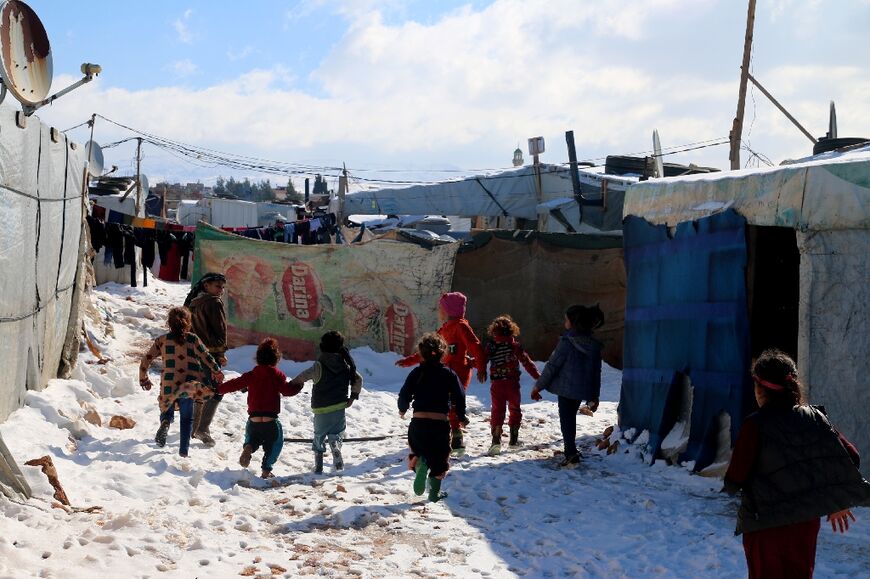
Lebanon saw the influx of an estimated 1.5 million refugees following the outbreak of Syria's civil war.
More than three quarters of them live below the poverty line, according to the UN.
Tens of thousands of Palestinian refugees also live in Lebanon, mainly in the country's 12 camps.
- Economic turmoil -
Lebanon is going through a severe economic crisis, described by the World Bank as one of the world's worst since the 1850s.
Lebanese residents have since 2019 suffered draconian banking restrictions on access to money.
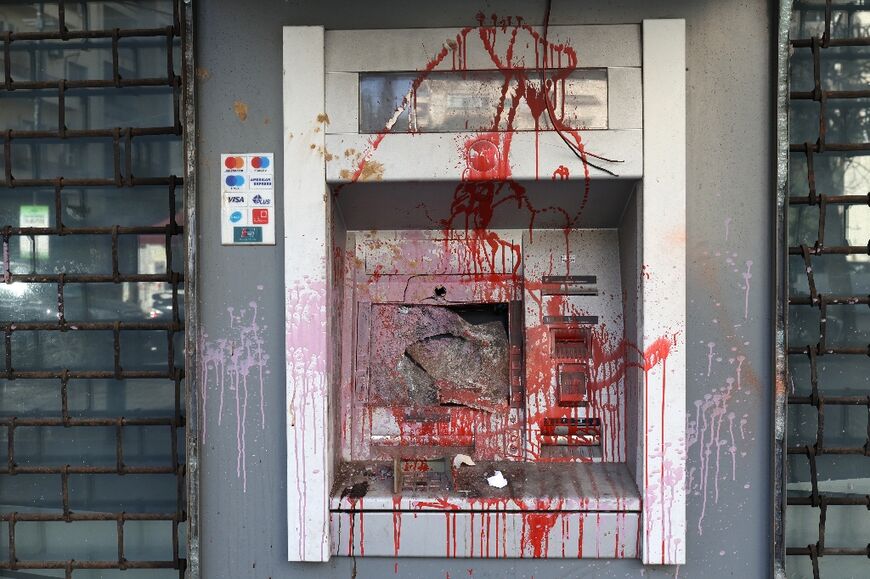
Meanwhile, the local currency has plummeted some 90 percent against the dollar on the black market.
Around 80 percent of the population are struggling to escape poverty, the UN says.
For the first time in its history, Lebanon announced in 2020 it was defaulting on its debt payments.
The country lags in development in areas such as water supply, electricity production and waste treatment.
The pain was worsened by the August 2020 Beirut port explosion of ammonium nitrate fertiliser that devastated entire neighbourhoods and killed more than 200 people.
- Ties with France -
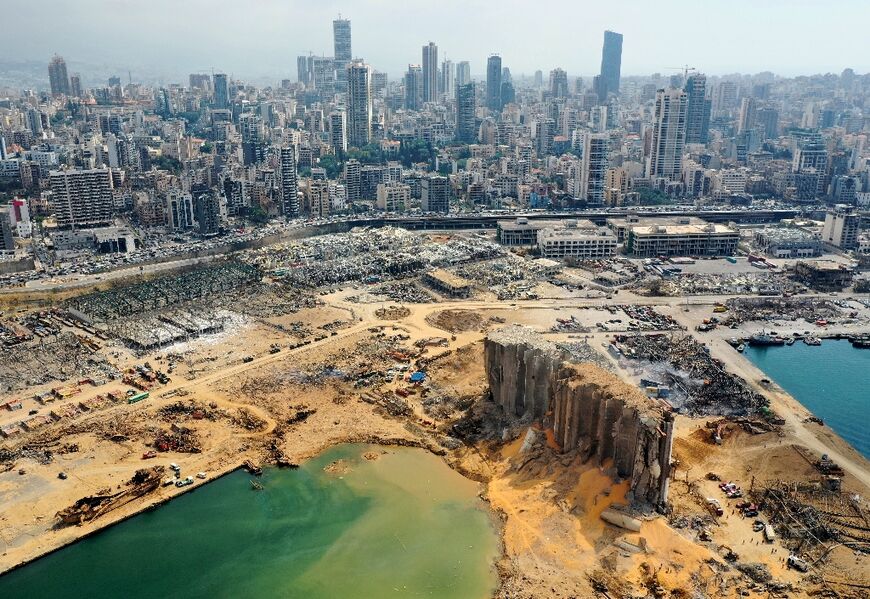
France is a traditional ally of Lebanon, with which it has historic, cultural, political and economic links, underpinned by the French language.
The close links go back centuries. In the 16th century after an accord with the Ottoman Empire, the kings of France became the official protectors of the East's Christians.
After the collapse of the Ottoman Empire, France became in 1920 the mandate power in Lebanon, setting the country's borders with Syria. It granted it independence in 1943.
Read more: https://www.al-monitor.com/originals/2022/05/lebanon-small-multi-religious-mideast-country#ixzz7Sx0hjjSD
Lebanon, a small Mediterranean country wracked by political and economic turmoil and the fallout of the decade-old Syrian conflict next door, holds parliamentary elections on May 15.
Here are some key facts about Lebanon.
- Multi-confessional -
The country with the cedar tree flag is one of the smallest in the Middle East, at about 10,000 square kilometres (3,900 square miles).

Its population of around 4.5 million Lebanese is dwarfed by its diaspora, spread across the Americas, Europe, Africa and Australia.
Lebanon is considered relatively liberal in a broadly conservative region. Political power is split between 18 recognised religious communities under a confessionalist form of government.
Lebanon is a parliamentary republic, with a 128-member house split between Muslims and Christians.
In line with Lebanon's "national pact" dating back to independence from France in 1943, the president must be a Maronite Christian, the prime minister a Sunni Muslim and the parliament speaker a Shiite.
- Between Israel and Syria -
Lebanon endured a brutal civil war between 1975 and 1990 and was under Syrian domination from the 1990s until troops withdrew in 2005.

Its political institutions have long been paralysed by disagreement between the pro- and anti-Syrian camps.
In March 1978, Israel launched "Operation Litani" in south Lebanon, which it said was to protect the north of its territory from fighters from the Palestine Liberation Organization (PLO). It withdrew partially in June that year.
In June 1982, Israeli troops invaded Lebanon and besieged Beirut, forcing the PLO to flee.
In mid-2006, a 34-day war pitted Israel -- whose troops had withdrawn from southern Lebanon in 2000 -- against the Lebanese Shiite group Hezbollah, which is backed by Iran.
In 2013, Hezbollah said it was fighting in Syria alongside the troops of President Bashar al-Assad, its involvement dividing the Lebanese political scene even more.
- Shelter for refugees -

Lebanon saw the influx of an estimated 1.5 million refugees following the outbreak of Syria's civil war.
More than three quarters of them live below the poverty line, according to the UN.
Tens of thousands of Palestinian refugees also live in Lebanon, mainly in the country's 12 camps.
- Economic turmoil -
Lebanon is going through a severe economic crisis, described by the World Bank as one of the world's worst since the 1850s.
Lebanese residents have since 2019 suffered draconian banking restrictions on access to money.

Meanwhile, the local currency has plummeted some 90 percent against the dollar on the black market.
Around 80 percent of the population are struggling to escape poverty, the UN says.
For the first time in its history, Lebanon announced in 2020 it was defaulting on its debt payments.
The country lags in development in areas such as water supply, electricity production and waste treatment.
The pain was worsened by the August 2020 Beirut port explosion of ammonium nitrate fertiliser that devastated entire neighbourhoods and killed more than 200 people.
- Ties with France -

France is a traditional ally of Lebanon, with which it has historic, cultural, political and economic links, underpinned by the French language.
The close links go back centuries. In the 16th century after an accord with the Ottoman Empire, the kings of France became the official protectors of the East's Christians.
After the collapse of the Ottoman Empire, France became in 1920 the mandate power in Lebanon, setting the country's borders with Syria. It granted it independence in 1943.
Read more: https://www.al-monitor.com/originals/2022/05/lebanon-small-multi-religious-mideast-country#ixzz7Sx0hjjSD
Timeline: Lebanon in economic, political dire straits
11/05/2022

11/05/2022

© IBRAHIM AMRO
Protestors demand better living conditions and the ouster of a cast of politicians who have monopolised power and influence for decades, on October 22, 2019 in Beirut
Lebanon, which holds parliamentary elections on May 15, has been mired in a deep financial, economic and social crisis, aggravated by a political deadlock.

Lebanon, which holds parliamentary elections on May 15, has been mired in a deep financial, economic and social crisis, aggravated by a political deadlock.

Lebanon’s then prime minister Hassan Diab delivering a statement at the presidential palace in Baabda, east of the capital Beirut, on April 30, 2020
Here is a recap since turmoil broke out in October 2019.
– Protests erupt –
Mass protests follow a government announcement on October 17, 2019 of a planned tax on voice calls made over messaging services such as WhatsApp.

Here is a recap since turmoil broke out in October 2019.
– Protests erupt –
Mass protests follow a government announcement on October 17, 2019 of a planned tax on voice calls made over messaging services such as WhatsApp.

© ANWAR AMRO
Police and forensic officers work at the scene of the massive explosion at the port of Lebanon’s capital Beirut, on August 5, 2020
In a graft-plagued country with poor public services, many see the tax as the last straw, with demonstrators demanding “the fall of the regime”.
The government of prime minister Saad Hariri scraps the tax the same day.

In a graft-plagued country with poor public services, many see the tax as the last straw, with demonstrators demanding “the fall of the regime”.
The government of prime minister Saad Hariri scraps the tax the same day.

Lebanon’s Prime Minister Najib Mikati at the presidential palace in Baabda on December 28, 2021
But protests continue over the ensuing weeks, culminating in huge demonstrations calling for the overhaul of a ruling class in place for decades and accused of systematic corruption.

But protests continue over the ensuing weeks, culminating in huge demonstrations calling for the overhaul of a ruling class in place for decades and accused of systematic corruption.

Lebanon’s former premier Saad Hariri, pictured on July 15, 2021
Hariri’s government resigns in late October.
– First default –
Lebanon, with a $92 billion debt burden equivalent to nearly 170 percent of its gross domestic product, announces in March 2020 that it will default on a payment for the first time in its history.
In April, after three nights of violent clashes, then-prime minister Hassan Diab says Lebanon will seek International Monetary Fund help after the government approves an economic rescue plan.
But talks with the IMF quickly go off the rails.
– Catastrophic blast –
A massive explosion on August 4, 2020 at Beirut port devastates entire neighbourhoods of the capital, kills more than 200 people and injures at least 6,500.

Hariri’s government resigns in late October.
– First default –
Lebanon, with a $92 billion debt burden equivalent to nearly 170 percent of its gross domestic product, announces in March 2020 that it will default on a payment for the first time in its history.
In April, after three nights of violent clashes, then-prime minister Hassan Diab says Lebanon will seek International Monetary Fund help after the government approves an economic rescue plan.
But talks with the IMF quickly go off the rails.
– Catastrophic blast –
A massive explosion on August 4, 2020 at Beirut port devastates entire neighbourhoods of the capital, kills more than 200 people and injures at least 6,500.

© JOSEPH EID
$100 traded at around 1.5 million Lebanese pounds on the black market on March 16, 2021 as Lebanon battled its worst economic crisis since the 1975-1990 civil war
It emerges the huge pile of volatile ammonium nitrate that caused one of the biggest non-nuclear explosions ever recorded had been left unsecured in a warehouse for six years, further enraging the Lebanese public.

It emerges the huge pile of volatile ammonium nitrate that caused one of the biggest non-nuclear explosions ever recorded had been left unsecured in a warehouse for six years, further enraging the Lebanese public.

Lebanon’s capital Beirut, with buildings in darkness during a power outage on October 11, 2021
– Political impasse –
Diab’s government resigns shortly after the blast after just over seven months in office.

– Political impasse –
Diab’s government resigns shortly after the blast after just over seven months in office.

© IBRAHIM AMRO
A Lebanese Shiite fighter takes aim with a Kalashnikov amid clashes in the Tayouneh suburb of Beirut, on October 14, 2021
Diplomat Mustapha Adib is named new premier but bows out after less than a month, and Hariri, who already served as prime minister three times, is named in October.
– One of worst crises –
Amid runaway inflation, authorities announce in February 2021 that bread prices will rise further.
In June, the World Bank says Lebanon’s economic collapse is likely to rank among the world’s worst financial crises since the mid-19th century.

Diplomat Mustapha Adib is named new premier but bows out after less than a month, and Hariri, who already served as prime minister three times, is named in October.
– One of worst crises –
Amid runaway inflation, authorities announce in February 2021 that bread prices will rise further.
In June, the World Bank says Lebanon’s economic collapse is likely to rank among the world’s worst financial crises since the mid-19th century.

Lebanon’s Prime Minister Najib Mikati, third from right, with an International Monetary Fund delegation
– New government –
After nine months of political horse-trading, Hariri steps aside on July 15, 2021 saying he is unable to form a government.
Billionaire Najib Mikati, Lebanon’s richest man and already twice prime minister, forms a new government on September 10 after a 13-month vacuum.
– Bloody clashes –
But the new government is shaken by demands from the powerful Hezbollah for the judge investigating the Beirut blast to be removed on grounds of political bias.
Tensions come to a boil on October 14, 2021 when a shootout kills seven people following a rally by Hezbollah and its ally Amal demanding Tarek Bitar’s dismissal.
– Accord with IMF –
On January 24, 2022 the IMF launches talks with Lebanese officials.
Mikati’s government meets for the first time after months of negotiations between rival factions.
On February 11 the IMF calls for fiscal reforms to ensure Lebanon can manage its debt load as well as measures to establish a “credible” currency system.
On April 7, the lender says it has reached a staff-level agreement to provide Lebanon with $3 billion in aid over four years.
– New government –
After nine months of political horse-trading, Hariri steps aside on July 15, 2021 saying he is unable to form a government.
Billionaire Najib Mikati, Lebanon’s richest man and already twice prime minister, forms a new government on September 10 after a 13-month vacuum.
– Bloody clashes –
But the new government is shaken by demands from the powerful Hezbollah for the judge investigating the Beirut blast to be removed on grounds of political bias.
Tensions come to a boil on October 14, 2021 when a shootout kills seven people following a rally by Hezbollah and its ally Amal demanding Tarek Bitar’s dismissal.
– Accord with IMF –
On January 24, 2022 the IMF launches talks with Lebanese officials.
Mikati’s government meets for the first time after months of negotiations between rival factions.
On February 11 the IMF calls for fiscal reforms to ensure Lebanon can manage its debt load as well as measures to establish a “credible” currency system.
On April 7, the lender says it has reached a staff-level agreement to provide Lebanon with $3 billion in aid over four years.
Timeline: Lebanon's ordeal - Economic and political crises since civil war
By Reuters Staff
BEIRUT (Reuters) - Lebanon is in the throes of a financial crisis widely seen as the biggest threat to its stability since the 1975-90 civil war, encouraging a new wave of emigration from the country.
With hard currency growing ever more scarce, the Lebanese pound has lost some 80% of its value, depositors have been shut out of their savings and unemployment are poverty are soaring.
Here are Lebanon’s main previous post-war upheavals.
2005
Former Lebanese Prime Minister Rafik al-Hariri is killed on Feb. 14 when a massive bomb exploded as his motorcade travelled through Beirut; 21 others also died.
A combination of subsequent mass demonstrations and international pressure force Syria to withdraw troops from Lebanon. Lebanese Shi’ite allies of Damascus stage their own big rallies in support of Syria.
Lebanon enters a new era free of Syrian domination. Hezbollah, an Iran-backed group and close ally of Damascus, enters government for the first time.
2008
May 6, 2008 - Siniora’s cabinet accuses Hezbollah of running a private telecoms network and installing spy cameras at Beirut airport. The cabinet vows legal action against the network.
May 7 - Hezbollah said the move against its telecoms network was a declaration of war by the government. After a brief conflict Hezbollah takes control of mainly Muslim west Beirut.
May 21 - After mediation, rival leaders sign a deal in Qatar to end 18 months of political conflict. Parliament elects Michel Suleiman, the army chief, as president.
2011
In January, Saad al-Hariri’s first government is toppled when Hezbollah and its allies quit because of tensions over the U.N.-backed Special Tribunal for Lebanon.
The tribunal later indicts four senior members of Hezbollah for the murder of Rafik al-Hariri. Hezbollah denies any role in the assassination. Its leader, Sayyed Hassan Nasrallah, said the authorities would not be able to find the indicted men.
A fifth Hezbollah member is indicted in 2013
2015
A crisis about waste erupts when authorities close the main landfill site near Beirut, having arranged no alternative. Large protests broke out as rotting waste filled streets and demonstrators chanted “You stink!” at the government. It became a glaring symbol of the failures of a sectarian power system unable to meet basic needs like electricity and water.
2017
Saad al-Hariri’s ties with Saudi Arabia, which is furious at Hezbollah’s expanding role in Lebanon, hit a nadir in November 2017 when it was widely acknowledged Riyadh had forced him to resign and held him in the kingdom. Saudi Arabia and Hariri publicly deny this version of events, though France’s Emmanuel Macron confirmed that Hariri was being held in Saudi Arabia.
2019
Amid a stagnant economy and slowing capital inflows, the government is under pressure to curb a massive budget deficit.
Proposals to cut the state wage and pension bill meet stiff opposition. The government vows to enact long-delayed reforms but fails to make progress that might unlock foreign support.
Oct. 17 - A government move to tax internet calls ignites big protests against the ruling elite. Lebanese of all sects take part, accusing leaders of corruption and economic mismanagement.
Hariri quits on Oct. 29, against the wishes of Hezbollah. Lebanon is left rudderless as the crisis deepens. A hard- currency liquidity crunch leads banks to impose tight curbs on cash withdrawals and transfers abroad.
2020
After two months of talks to form a new, Hariri-led coalition government hit a dead end, Hezbollah and its allies back Hassan Diab, a little-known academic and former education minister, for the post of prime minister.
March 7 - Diab announces Lebanon cannot repay a maturing bond and calls for negotiations to restructure its debt.
May 1 - Beirut signs a formal request for IMF assistance after approving a plan setting out vast losses in the financial system. The banking association rejects the plan, saying its proposals for restructuring the banking sector would further destroy confidence in Lebanon.
July - IMF talks are put on hold pending agreement on the Lebanese side over the scale of financial loses. The Lebanese pound touches lows close to 10,000 to the dollar. The rate was 1,500 in October.
Writing by Tom Perry and William Maclean; editing by Ed Osmond
By Reuters Staff
BEIRUT (Reuters) - Lebanon is in the throes of a financial crisis widely seen as the biggest threat to its stability since the 1975-90 civil war, encouraging a new wave of emigration from the country.
With hard currency growing ever more scarce, the Lebanese pound has lost some 80% of its value, depositors have been shut out of their savings and unemployment are poverty are soaring.
Here are Lebanon’s main previous post-war upheavals.
2005
Former Lebanese Prime Minister Rafik al-Hariri is killed on Feb. 14 when a massive bomb exploded as his motorcade travelled through Beirut; 21 others also died.
A combination of subsequent mass demonstrations and international pressure force Syria to withdraw troops from Lebanon. Lebanese Shi’ite allies of Damascus stage their own big rallies in support of Syria.
Lebanon enters a new era free of Syrian domination. Hezbollah, an Iran-backed group and close ally of Damascus, enters government for the first time.
2006
In July, Hezbollah crosses the border into Israel, kidnaps two Israeli soldiers and kills others, sparking a five-week war. At least 1,200 people in Lebanon and 158 Israelis are killed.
After the war, tensions in Lebanon simmer over Hezbollah’s powerful arsenal. In November, Hezbollah and its allies quit the cabinet led by Western-backed Prime Minister Fouad Siniora and organise street protests against it.
2007
Hezbollah and its allies maintain a sit-in protest against the Siniora government for the entire year. Their stated demand is veto power in the government.
In May, fighting erupts at a Palestinian camp in northern Lebanon between the Lebanese army and Sunni Islamist militants of the Fatah al-Islam group. Thousands of Palestinian refugees are forced to flee the Nahr al-Bared camp. In September, Lebanese troops seize control of the camp after more than three months of fighting that kills more than 300 people.
In July, Hezbollah crosses the border into Israel, kidnaps two Israeli soldiers and kills others, sparking a five-week war. At least 1,200 people in Lebanon and 158 Israelis are killed.
After the war, tensions in Lebanon simmer over Hezbollah’s powerful arsenal. In November, Hezbollah and its allies quit the cabinet led by Western-backed Prime Minister Fouad Siniora and organise street protests against it.
2007
Hezbollah and its allies maintain a sit-in protest against the Siniora government for the entire year. Their stated demand is veto power in the government.
In May, fighting erupts at a Palestinian camp in northern Lebanon between the Lebanese army and Sunni Islamist militants of the Fatah al-Islam group. Thousands of Palestinian refugees are forced to flee the Nahr al-Bared camp. In September, Lebanese troops seize control of the camp after more than three months of fighting that kills more than 300 people.
2008
May 6, 2008 - Siniora’s cabinet accuses Hezbollah of running a private telecoms network and installing spy cameras at Beirut airport. The cabinet vows legal action against the network.
May 7 - Hezbollah said the move against its telecoms network was a declaration of war by the government. After a brief conflict Hezbollah takes control of mainly Muslim west Beirut.
May 21 - After mediation, rival leaders sign a deal in Qatar to end 18 months of political conflict. Parliament elects Michel Suleiman, the army chief, as president.
2011
In January, Saad al-Hariri’s first government is toppled when Hezbollah and its allies quit because of tensions over the U.N.-backed Special Tribunal for Lebanon.
The tribunal later indicts four senior members of Hezbollah for the murder of Rafik al-Hariri. Hezbollah denies any role in the assassination. Its leader, Sayyed Hassan Nasrallah, said the authorities would not be able to find the indicted men.
A fifth Hezbollah member is indicted in 2013
2012
Hezbollah fighters deploy into Syria, secretly at first, to aid Syrian government forces facing a mostly Sunni rebellion against President Bashar al-Assad. The group plays a major role in beating back the rebellion.
Hezbollah fighters deploy into Syria, secretly at first, to aid Syrian government forces facing a mostly Sunni rebellion against President Bashar al-Assad. The group plays a major role in beating back the rebellion.
2015
A crisis about waste erupts when authorities close the main landfill site near Beirut, having arranged no alternative. Large protests broke out as rotting waste filled streets and demonstrators chanted “You stink!” at the government. It became a glaring symbol of the failures of a sectarian power system unable to meet basic needs like electricity and water.
2017
Saad al-Hariri’s ties with Saudi Arabia, which is furious at Hezbollah’s expanding role in Lebanon, hit a nadir in November 2017 when it was widely acknowledged Riyadh had forced him to resign and held him in the kingdom. Saudi Arabia and Hariri publicly deny this version of events, though France’s Emmanuel Macron confirmed that Hariri was being held in Saudi Arabia.
2019
Amid a stagnant economy and slowing capital inflows, the government is under pressure to curb a massive budget deficit.
Proposals to cut the state wage and pension bill meet stiff opposition. The government vows to enact long-delayed reforms but fails to make progress that might unlock foreign support.
Oct. 17 - A government move to tax internet calls ignites big protests against the ruling elite. Lebanese of all sects take part, accusing leaders of corruption and economic mismanagement.
Hariri quits on Oct. 29, against the wishes of Hezbollah. Lebanon is left rudderless as the crisis deepens. A hard- currency liquidity crunch leads banks to impose tight curbs on cash withdrawals and transfers abroad.
2020
After two months of talks to form a new, Hariri-led coalition government hit a dead end, Hezbollah and its allies back Hassan Diab, a little-known academic and former education minister, for the post of prime minister.
March 7 - Diab announces Lebanon cannot repay a maturing bond and calls for negotiations to restructure its debt.
May 1 - Beirut signs a formal request for IMF assistance after approving a plan setting out vast losses in the financial system. The banking association rejects the plan, saying its proposals for restructuring the banking sector would further destroy confidence in Lebanon.
July - IMF talks are put on hold pending agreement on the Lebanese side over the scale of financial loses. The Lebanese pound touches lows close to 10,000 to the dollar. The rate was 1,500 in October.
Writing by Tom Perry and William Maclean; editing by Ed Osmond
No comments:
Post a Comment